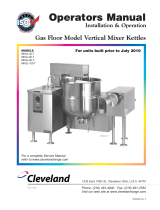2
|
VIKING / VIKING COMBI
Rev. 2.0 (1.8.2017)
CONTENTS
1. General .......................................................................................................................................................4
1.1. Symbols used in the manual .......................................................................................................................4
1.2. Symbols used on the appliance ...................................................................................................................4
1.3. Checking the relationship of the appliance and the manual ........................................................................4
2. Safety .........................................................................................................................................................6
2.1. General ........................................................................................................................................................6
2.2. Safety features ............................................................................................................................................6
2.3. Emergency/stop button ...............................................................................................................................6
2.4. Warnings .....................................................................................................................................................7
3. Functional description ..............................................................................................................................8
3.1. Operating principle ......................................................................................................................................8
3.2. Construction and control panel ....................................................................................................................9
3.2.1. Controlpanel .............................................................................................................................................. 11
4. Operating instructions ............................................................................................................................12
4.1. Before use .................................................................................................................................................12
4.1.1. After the installation ..................................................................................................................................12
4.1.2. Before the fi rst use....................................................................................................................................12
4.1.3. Daily ...........................................................................................................................................................12
4.1.4. Quarterly ....................................................................................................................................................13
4.1.5. Yearly .........................................................................................................................................................13
4.1.6. Checking the water level of the steam generator (electrically heated models) .........................................14
4.1.7. Emptying of surplus condensate water (steam heated models) ...............................................................14
4.1.8. Total emptying of the kettle jacket .............................................................................................................15
4.2. Operation ...................................................................................................................................................15
4.2.1. Cooking .....................................................................................................................................................15
4.2.2. Tilting the kettle .........................................................................................................................................16
4.2.3. Filling water into the kettle(Viking 40-400) ................................................................................................16
4.2.4. Mixer operation (Viking Combi) .................................................................................................................17
4.2.5. Cooling system (optional) ..........................................................................................................................21
4.2.6. Automatic water fi lling (option)..................................................................................................................23
4.2.7. Temperature display (option, Viking Combi) ...............................................................................................25
4.3. After use ....................................................................................................................................................26
4.3.1. Cleaning the kettle .....................................................................................................................................26
4.3.2. Treatment of stainless steel ......................................................................................................................28
4.3.3. Notes on service work ..............................................................................................................................29
5. Troubleshooting .......................................................................................................................................30
6. Installation ...............................................................................................................................................32
6.1. Before installation ......................................................................................................................................32
6.1.1. Transport and reception .............................................................................................................................32
6.1.2. Storage ......................................................................................................................................................32
6.1.3. Facilities .....................................................................................................................................................32
6.1.4. Unpacking the unit.....................................................................................................................................32
6.1.5. Industrial safety during installation ............................................................................................................33
6.2. Installation .................................................................................................................................................33
6.2.1. Installation on subsurface frames cast into the fl oor ................................................................................33





















